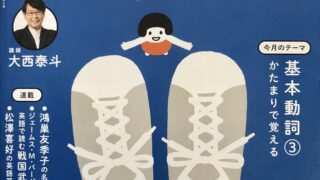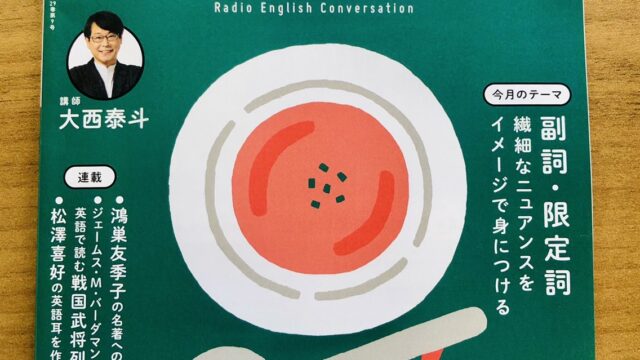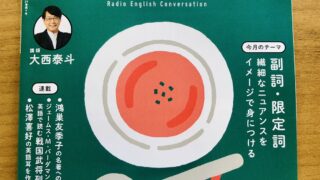【ラジオ英会話】Lesson 174 限定詞④:共有イメージの the – December 15 Thursday, 2022

December 15 Thursday, 2022
Lesson 174 限定詞④:共有イメージの the
☆Words & Phrases
**mistake:
**though:
I think I made one mistake though.
**notice:
Really? I didn’t notice.
**no wonder ~:
Oh, no wonder you’re so good.
**instrument:
Do you play any instrument?
**air guitar:
I can play the air guitar.
☆Air guitar
O: Chris, could you explain this phrase to the audience?
C: Air guitar is when you pretend to be playing a heavy metal electric guitar. And then, you make wild gestures while imagining the shrieking sounds of a real rock guitar.
R: But you don’t actually have a guitar, right?
C: That’s right. You’re just imagining, you’re pretending.
**pretend ~:
**shrieking:
☆Grammar & Vocabulary
① Did you hear me play?
目的語説明型(知覚構文)- SVOC
知覚を表す「見る・聞く」といった動詞は、目的語説明型(SVOC)で頻繁に用いられる。
この文は hear が使われている。
目的語説明型は、目的語とその後ろの説明語句との間に「=(イコール)」あるいは「主語 – 述語」の関係がある形。
この文は「me が play するのを hear(聞く)」ということ。
② How long have you been playing?
現在完了進行形
「(今に)迫ってくる」現在完了形と、行為を生き生きと描写する進行形のハイブリッド。
今に至るまで「ずっと~している」 と、行為の継続を表している。
☆Key Sentence & Feel English
I didn’t know you played the piano so well.
「楽器の the 」と呼ばれる使い方。なぜ「ピアノを弾く」は play the piano と the が付くのか?
the の「ひとつに決まる」が、「ああ、あれのことね」とピンとくる、誰しもが持つ共有のイメージにつながっているため。
the piano は「美しい音を奏でるあの楽器」のことで、具体的なモノとしての楽器を意味しているわけではない!
モノとしての piano であれば、
There’s a piano in my living room.
のように a piano で通常の名詞と同じように扱われる。
① You play the violin like a pro.
I often listen to the radio.
Please call the police.
the violin
the radio
は、具体的なモノを指しているわけではなく、「そうした楽器」や「そうした通信媒体」のこと。
the police
は、誰しもがピンとくる悪を駆逐する「ああした組織」のこと
② The poor are getting poorer, the rich are getting richer.
「the + 形容詞」で「~の人々(全体)」を表す。
the poor
the rich
the young
the old
the weak
the strong
the homeless
③ the giant panda
The car is the most convenient way of transportation.
The British gentleman is a dying breed.
→「the + 名詞」は「種族全体」を表すことがある。「ああした動物」や「ああした製品」という共有イメージを示している。
「イギリス紳士」に the が用いられているのは、帽子をかぶった典型的な「イギリス紳士」が思い浮かべられているため。「ああ、あれか」の the の例。
ちなみに、
✖ The Japanese gentleman
とは言えない。なぜなら誰もが思い浮かべる典型的なイメージがないから。
☆Expression in Action
①君がサックスを演奏するとは知らなかったよ。
②私たちの組織の主な内容は。貧しい人々を助けることです。
**organization:
③シロサイは絶滅してしまっているのですか?
**rhino:
**extinct:
☆Ending
O: Hey guys. Is the British gentleman extinct?
C: Well, we can’t say it’s extinct, but it’s an endangered species.
O: Uh-huh.
R: Well, of course, we can’t say it’s extinct. We have one right here. Chris!!
December 15 Thursday, 2022
Lesson 174 限定詞④:共有イメージの the
(日本語訳・解説付き)
☆Words & Phrases
**mistake: ミス、間違い
**though: ~だけれども
I think I made one mistake though.
1か所だけミスがあったと思います。
※ though は文末で「~だけれどもね」ですね!
※「ミス・間違い」は miss ではなく mistake です。
**notice: センス、感じる(自分の感覚の中にふっと入って来て「あっ」と気付くイメージ)
Really? I didn’t notice.
本当に?私は気が付きませんでした。
**no wonder ~: なるほど~なわけだ
Oh, no wonder you’re so good.
ああ、だからあなたはとても上手なのですね。
※ wonder の基本は「大きな?」なので、no wonder は「全く?がない」です

rainyjuneenglish
**instrument: 楽器
Do you play any instrument?
あなたは何か楽器を演奏しますか?
**air guitar: ギターの弾き真似、エアギター
I can play the air guitar.
エアギターを弾くことができます。
☆Air guitar
O: Chris, could you explain this phrase to the audience?
C: Air guitar is when you pretend to be playing a heavy metal electric guitar. And then, you make wild gestures while imagining the shrieking sounds of a real rock guitar.
R: But you don’t actually have a guitar, right?
C: That’s right. You’re just imagining, you’re pretending.
**pretend ~: ~のふりをする
**shrieking: 金切り声を出す
☆Grammar & Vocabulary
① Did you hear me play?
あなたは私が演奏するのを聞きましたか?
目的語説明型(知覚構文)- SVOC
知覚を表す「見る・聞く」といった動詞は、目的語説明型(SVOC)で頻繁に用いられる。
この文は hear が使われている。
目的語説明型は、目的語とその後ろの説明語句との間に「=(イコール)」あるいは「主語 – 述語」の関係がある形。
この文は「me が play するのを hear(聞く)」ということ。

rainyjuneenglish
② How long have you been playing?
あなたはどのくらい長く演奏し続けているのですか?
現在完了進行形
「(今に)迫ってくる」現在完了形と、行為を生き生きと描写する進行形のハイブリッド。
今に至るまで「ずっと~している」 と、行為の継続を表している。
☆Key Sentence & Feel English
I didn’t know you played the piano so well.
あなたがあんなに上手くピアノを弾くなんて知りませんでした。
「楽器の the 」と呼ばれる使い方。なぜ「ピアノを弾く」は play the piano と the が付くのか?
the の「ひとつに決まる」が、「ああ、あれのことね」とピンとくる、誰しもが持つ共有のイメージにつながっているため。
the piano は「美しい音を奏でるあの楽器」のことで、具体的なモノとしての楽器を意味しているわけではない!
モノとしての piano であれば、
There’s a piano in my living room.
私の家のリビングにはピアノがあります。
のように a piano で通常の名詞と同じように扱われる。
① You play the violin like a pro.
あなたはプロのようにバイオリンを弾きますね。
I often listen to the radio.
私はしばしばラジオを聞きます。
Please call the police.
警察を呼んでください。
the violin
the radio
は、具体的なモノを指しているわけではなく、「そうした楽器」や「そうした通信媒体」のこと。
the police
は、誰しもがピンとくる悪を駆逐する「ああした組織」のこと
② The poor are getting poorer, the rich are getting richer.
貧しい人々はますます貧しく、お金持ちはますますお金持ちになっています。
「the + 形容詞」で「~の人々(全体)」を表す。
the poor
貧しい人々
the rich
お金持ちの人々
the young
若い人々
the old
年を取った人々
the weak
弱者
the strong
強者
the homeless
家のない人々
③ the giant panda
ジャイアントパンダ(という種族)
The car is the most convenient way of transportation.
車は最も便利な交通手段です。
The British gentleman is a dying breed.
イギリス紳士は絶滅危惧種です。
→「the + 名詞」は「種族全体」を表すことがある。「ああした動物」や「ああした製品」という共有イメージを示している。
「イギリス紳士」に the が用いられているのは、帽子をかぶった典型的な「イギリス紳士」が思い浮かべられているため。「ああ、あれか」の the の例。
ちなみに、
✖ The Japanese gentleman
とは言えない。なぜなら誰もが思い浮かべる典型的なイメージがないから。
☆Expression in Action
①君がサックスを演奏するとは知らなかったよ。
I didn’t know you played the sax.
②私たちの組織の主な内容は。貧しい人々を助けることです。
Our organization’s main goal is to help the poor
**organization: 組織
③シロサイは絶滅してしまっているのですか?
Is the white rhino extinct?
**rhino: サイ ※発音注意!「ライノ」のように読みます
**extinct: 絶滅した、死に絶えた
☆Ending
O: Hey guys. Is the British gentleman extinct?
C: Well, we can’t say it’s extinct, but it’s an endangered species.
O: Uh-huh.
R: Well, of course, we can’t say it’s extinct. We have one right here. Chris!!
December 15 Thursday, 2022
Lesson 174 限定詞④:共有イメージの the
(日本語→英語バージョン)
☆Words & Phrases
**ミス、間違い:
**~だけれども:
1か所だけミスがあったと思います。
→
**センス、感じる(自分の感覚の中にふっと入って来て「あっ」と気付くイメージ):
本当に?私は気が付きませんでした。
→
**なるほど~なわけだ:
ああ、だからあなたはとても上手なのですね。
→

rainyjuneenglish
**楽器:
あなたは何か楽器を演奏しますか?
→
**ギターの弾き真似、エアギター:
エアギターを弾くことができます。
→
① あなたはプロのようにバイオリンを弾きますね。
私はしばしばラジオを聞きます。
警察を呼んでください。
the violin
the radio
は、具体的なモノを指しているわけではなく、「そうした楽器」や「そうした通信媒体」のこと。
the police
は、誰しもがピンとくる悪を駆逐する「ああした組織」のこと
② 貧しい人々はますます貧しく、お金持ちはますますお金持ちになっています。
「the + 形容詞」で「~の人々(全体)」を表す。
貧しい人々
お金持ちの人々
若い人々
年を取った人々
弱者
強者
家のない人々
③ ジャイアントパンダ(という種族)
車は最も便利な交通手段です。
イギリス紳士は絶滅危惧種です。
→「the + 名詞」は「種族全体」を表すことがある。「ああした動物」や「ああした製品」という共有イメージを示している。
「イギリス紳士」に the が用いられているのは、帽子をかぶった典型的な「イギリス紳士」が思い浮かべられているため。「ああ、あれか」の the の例。
ちなみに、
✖ The Japanese gentleman
とは言えない。なぜなら誰もが思い浮かべる典型的なイメージがないから。


